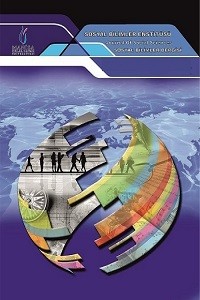Öz
Devletlerin kamusal ihtiyaçları karşılayabilmeleri için vergi
tahsilatı önemli bir husustur. Yapılan araştırmalar, gelir vergisinin
performansında düşüşler olduğunu ortaya koymaktadır. Bu durum
devletlerin en etkin ve verimli vergi tahsilatını yapabilecekleri çeşitli
alternatif yollar aramasına neden olmuştur. Bu alternatiflerden biri
Kişisel Harcama Vergisidir. Nicholas Kaldor 1955 yılında, "An
Expenditure Tax" isimli çalışmasında tüketimin gelirden daha uygun
bir vergi matrahı olduğunu savunmuştur. Bu nedenle literatürde
Kaldor Tipi Harcama Vergisi olarak da yer almaktadır. Literatürde
Nicholas Kaldor’un yanı sıra; Thomas Hobbes, John Stuart Mill, Irving
Fisher ve William D. Andrews gibi önemli iktisatçıların da bu vergi
türünü destekleyen görüşleri bulunmaktadır. Kişisel harcama vergisi,
bireylerin dönemsel harcamalarının toplamı üzerinden alınan dolaysız
bir vergidir, başkasına yansıtılamamaktadır. Dolayısıyla vergiyi ödeyen
kimse aynı zamanda verginin yükümlüsüdür. Bu özelliği sayesinde,
vergilemenin mali, ekonomik ve sosyal amaçlarının
gerçekleştirilmesine hizmet edebilecek nitelikte bir vergi türüdür.
Çalışmada, Kaldor tarafından önerilen dolaysız bir vergi olan Kişisel
Harcama Vergisinin teorik yapısı incelenecek ve etkinliği
değerlendirilecektir.
Anahtar Kelimeler
Kaynakça
- ÖZCAN Pelin Mastar, KAYALIDERE Gül (2017), “Kaldor Tipi Vergileme: Teorik Bir Yaklaşım”, II. Uluslararası Sosyal Bilimler Sempozyumu, Alaaddin Keykubat Üniversitesi, Alanya.
- KAY J. A. , KİNG M. A. (1990), British Tax System, Oxford University Press, 5. Baskı, New York, https://www.ifs.org.uk/docs/kay_king.pdf, (Erişim: 10.05.2018).
- ÇELİKKAYA Ali, EDİZDOĞAN Nihat (2012), Vergilerin Ekonomik Analizi, Dora Yayıncılık, 2. Baskı.
Öz
Tax collection is an important issue to ensure that
governments provide public needs. Research reveal that there is a
decline in the performance of the income tax. This situation has led
states to look for alternative ways to do the most efficient and efficient
tax collection. One of these alternatives is Personal Expenditure Tax. n
1955, Nicholas Kaldor argued that "An Expenditure Tax" was a more
appropriate tax base for consumption. For this reason, it is also
included in the literature as the Caldor Type Expenditure Tax. In
addition to Nicholas Kaldor, Major economists such as Thomas Hobbes,
John Stuart Mill, Irving Fisher, and William D. Andrews have views that support this tax model. The personal expenditure tax is a direct tax on
the sum of the individual's period spending and can not be reflected to
someone else. Therefore, the person who pays the tax is also obliged to
the taxpayer at the same time. With this feature, it is a type of tax that
can serve the realization of the financial, economic and social
objectives of taxation. In the study, the theoretical structure of Personal
Spending Tax, a direct tax proposed by Kaldor, will be examined and its
effectiveness evaluated.
Anahtar Kelimeler
Kaynakça
- ÖZCAN Pelin Mastar, KAYALIDERE Gül (2017), “Kaldor Tipi Vergileme: Teorik Bir Yaklaşım”, II. Uluslararası Sosyal Bilimler Sempozyumu, Alaaddin Keykubat Üniversitesi, Alanya.
- KAY J. A. , KİNG M. A. (1990), British Tax System, Oxford University Press, 5. Baskı, New York, https://www.ifs.org.uk/docs/kay_king.pdf, (Erişim: 10.05.2018).
- ÇELİKKAYA Ali, EDİZDOĞAN Nihat (2012), Vergilerin Ekonomik Analizi, Dora Yayıncılık, 2. Baskı.
Ayrıntılar
| Birincil Dil | Türkçe |
|---|---|
| Bölüm | İktisadi ve idari Bilimler Sayısı |
| Yazarlar | |
| Yayımlanma Tarihi | 30 Haziran 2019 |
| Yayımlandığı Sayı | Yıl 2019 Cilt: 17 Sayı: 2 |


